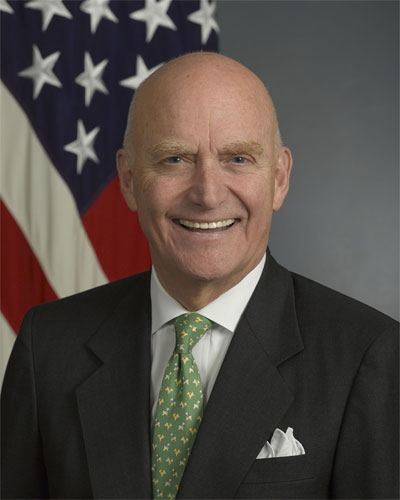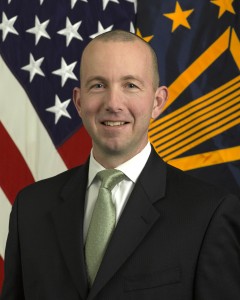John R. Campbell
Deputy Assistant Secretary of Defense
 In 2010, Mr. John R. Campbell was appointed by the Secretary of Defense as to lead the Office of Wounded Warrior Care and Transition Policy, where he is the Deputy Assistant Secretary responsible for ensuring wounded, ill, injured and transitioning Service members receive high quality services including the tools needed to transition seamlessly to civilian life.
In 2010, Mr. John R. Campbell was appointed by the Secretary of Defense as to lead the Office of Wounded Warrior Care and Transition Policy, where he is the Deputy Assistant Secretary responsible for ensuring wounded, ill, injured and transitioning Service members receive high quality services including the tools needed to transition seamlessly to civilian life.
In 2007, Mr. Campbell founded and served as Chief Executive Officer of MyVetwork, an on-line social network whose mission is to create one place where service men and women, veterans and their families can connect, support each other, find resources and share information with others in the military community.
From 1997- 2007, Mr. Campbell served as Chief Financial Officer and Senior Advisor for Wf360, where he helped build interactive dialogue-based initiatives that achieve a variety of specific goals for large organizations with dispersed workforces, as well as companies interested in leveraging customer relationships. Wf360’s Global Conservationalists have included Meg Whitman, CEO of eBay, General James Jones, Supreme Allied Commander of NATO Forces, and Christine Lagarde, France’s Finance Minister.
Prior to his service with Wf360, Mr. Campbell held high ranking leadership positions within the financial services industry including his role as Managing Director Senior Advisor for Credit Suisse First Boston, in the capacity of Chief of Staff for Global Banking, where he oversaw strategic planning, budgeting, and resource management. Before serving in this capacity, Mr. Campbell served in several roles in senior management for Credit Suisse including Managing Director and Head of Commercial Banking – North America.
His tenure within the financial sector included positions with J.P. Morgan and Company, Inc. where he was deputy Project manager for Morgan’s $1billion new headquarters building on Wall Street. Before that, he was responsible for the bank’s lending portfolio in the Southern cone of Latin America. Mr. Campbell also played a key role in merging Morgan’s National and International Banking Divisions.
Mr. Campbell served in the United States Marine Corps from 1967 – 1970 and served as a platoon commander in Vietnam in 1968 where he received two purple hearts. Mr. Campbell holds a Bachelors of Science in Business Administration (B.S.B.A.) from Georgetown University and a Masters of Business Administration (M.B.A.) from Columbia University.
Philip A. Burdette
Principal Director
On March 1, 2011, Mr. Philip A. Burdette was appointed as the Principal Director for the Office of Wounded Warrior Care and Transition Policy.
Mr. Burdette is responsible for policy and oversight related to wounded, ill, injured and transitioning Service members. He is also the Executive Director of the Senior Oversight Committee (SOC) and Joint Executive Council (JEC). He is a member of the Senior Executive Service for the Department of Defense.
In 2009, Mr. Burdette served as the Department of Homeland Security’s (DHS) Federal Security Director for Maryland and Delaware where he directed a workforce of more than 700 employees and led security actions in the National Capital Region with the Transportation Security Administration (TSA). In this role, Mr. Burdette led the Baltimore Washington International Airport to recognition as the top performing airport out of 452 TSA airports.
He was chosen as the standing incident manager for the TSA and led their efforts in emerging international security incidents. In addition, he directed TSA efforts for DHS National Special Security Events, including the 2010 National Nuclear Summit.
While working at the TSA Headquarters, Mr. Burdette led initiatives for the TSA Administrator’s top priority projects, including the TSA approach to the 2007 collective bargaining legislation impacting more than 46,000 employees and the 9/11 Commission legislation.
In 2007, Mr. Burdette received the Department of Homeland Security’s “Secretary’s Award for Excellence” for establishing DHS’ Visible Intermodal Prevention and Response security teams, an interagency security program targeting known vulnerabilities in multiple transportation modes.
From 2003 to 2006, Mr. Burdette served in leadership and law enforcement positions within DHS, including Senior Advisor to the Assistant Administrator, Assistant Special Agent in Charge for Field Operations, and Special Assistant to the Deputy Assistant Administrator. He has served as a Special Agent with both DHS and the National Security Agency.
Mr. Burdette has received numerous awards, including the Administrator’s Gold and Bronze Medals and, in 2006, was selected as TSA’s “Employee of the Year.”
Mr. Burdette holds a Bachelors (B.A.) degree from George Washington University and has graduated from resident programs at the Federal Executive Institute, the Federal Law Enforcement Training Center, and the Marine Corps University.
Mr. Burdette served in the Marine Corps, achieving the rank of Major. His awards and decorations include the Meritorious Service Medal and the Navy and Marine Corps Commendation Medal.
Robert S. Carrington
Director for Recovery Care Coordination
After initially enlisting in the U.S. Army in 1975, Mr. Bob Carrington graduated from the U.S. Military Academy in 1980 and served twenty years in the U.S. Army as an Infantry Officer. As an Army Officer, he served as a platoon leader, company commander and battalion commander. He also served on staffs at Battalion, Corps, Theater Army, Military Academy, Joint Task Force, and Headquarters, Department of the Army level.
One of his most unusual assignments as an Infantry Officer was when he was selected for graduate school and subsequently assigned as a Cadet Counselor at West Point. Another unusual assignment was his final assignment in uniform when he served as the Women in the Army Policy Branch Chief and Army Liaison to DACOWITS.
After retiring from active duty in 2000, Lieutenant Colonel Carrington took a civil service position at the Library of Congress. Later, he worked for a short time as an Associate with Booz, Allen & Hamilton working on the Army’s eBenefits effort until January 2002 when he returned to the Army Staff as a Department of the Army Civilian. First, serving as the Deputy Chief, Army Readiness Division, G-3, the Division Chief, and later serving for three years as the Director for Strategy Management.
In 2007, Mr. Carrington volunteered to deploy to Iraq on a detail to the Department of State to serve as a Senior Governance Advisor on the Western Anbar Embedded Provincial Reconstruction Team where he was further embedded with a U.S. Marine Corps Task Force in al Qaim. He returned in 2008 to serve as an advisor on the Chief of Staff of the Army’s Enterprise Task Force and then transferred to the Office of the Secretary of Defense to serve as the Chief of Staff of the Plans Deputate.
In the summer of 2009, he was asked by the Department of State to serve again on a detail, this time supporting Governance and Development Lines of Operation as a multiple District Support Team Leader in Naray, Afghanistan working with a U.S. Army Task Force. During this second deployment, he was found unconscious and was medically evacuated through Bagram to Landstuhl, Germany. Afterwards, he chose to remain in Theater and returned to his position at Forward Operating Base Bostick in northeast Afghanistan.
In the fall of 2010, he returned to his previous position in the Office of the Under Secretary of Defense for Personnel and Readiness until he joined the Office of Wounded Warrior Care & Transition Policy.
Bret Stevens
Director for Transition Policy
In 2009, Mr. Bret Stevens was selected as the Director, Transition Policy in the Office of Wounded Warrior Care and Transition Policy, Office of the Secretary of Defense (Personnel and Readiness). He is responsible for policy development and program oversight related to the Service Secretaries’ operation of the Disability Evaluation System. He also provides policy oversight for the Physical Disability Board of Review, a Congressionally-mandated disability appellate process for former Service members.
Prior to serving in his present position, Mr. Stevens served 28 years in the Air Force where he held leadership positions in a variety of base, joint and Air Force Headquarters-level assignments.
In 2007, he served as the interim Director, Personnel Program Management, Headquarters Air Force Personnel Center, Randolph Air Force Base, Texas. The Directorate’s 250+ military and civilian members managed a wide variety of programs covering the Air Force personnel “life cycle,” including accession, evaluation, promotion, separation, and retirement programs.
In 2006, he was Chief, United States Air Force Disability Division, the senior policymaker and program manager for the Air Force’s Disability Evaluation System affecting the retention, disability retirement or discharge of over 6,000 Airmen annually. In 2003, he became the President of the United States Air Force’s Formal Physical Evaluation Board where he conducted more than 2,500 for-the-record hearings for Airmen appealing their Informal Physical Evaluation Board disability determination.
In 2000, he was selected as Chief, Retirements and Separations Division, Headquarters Air Force Personnel Center, Randolph Air Force Base, Texas, providing program oversight of all active duty retirements and separations. In 1996 he was selected to command the 62nd Mission Support Squadron, McChord Air Force Base, Washington, serving as the personnel advisor to the wing commander as well as the personnel program manager for the base’s more than 2,500 assigned Airmen and civilian personnel.
His military awards include the Legion of Merit, Defense Meritorious Service Medal, and four Air Force Meritorious Service medals.
Mr. Stevens received his Masters in Management from National University, and holds a Masters in Military Studies from Air War College and a Bachelors of Science in Business Administration from Kansas State University. His formal military education includes graduating from Air War College, Armed Forces Staff College, and Air Command and Staff College.
